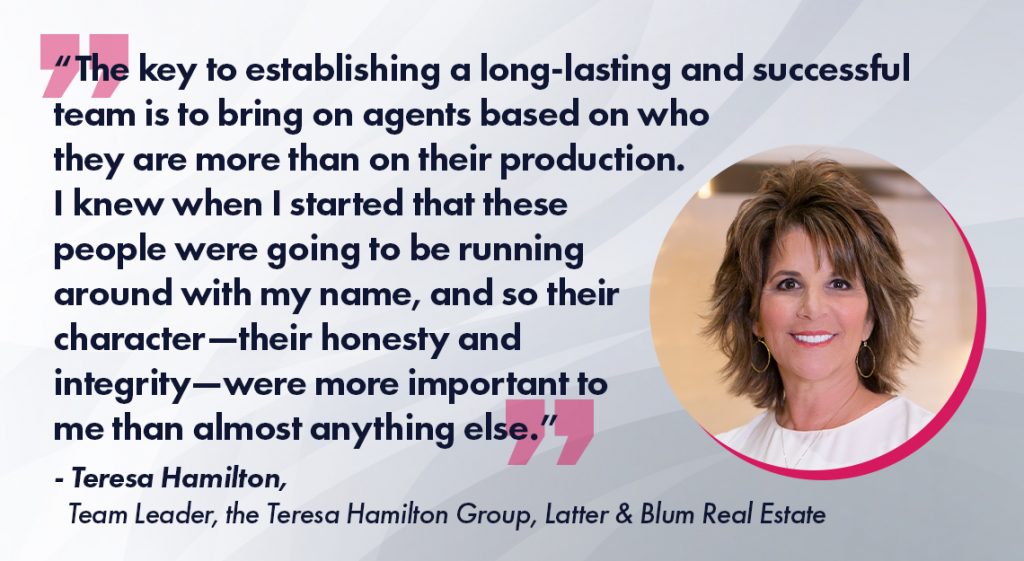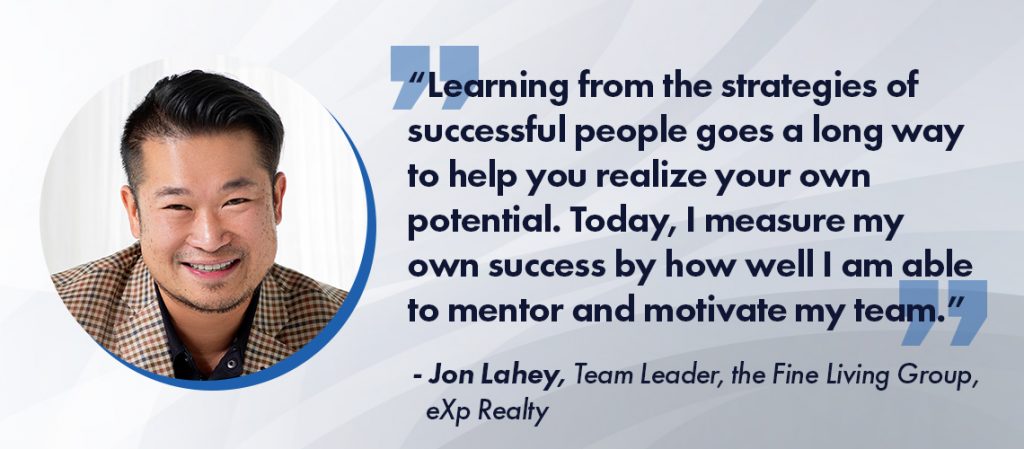There are many clear benefits to teaming, both for members and the clients they serve:
- The knowledge and experience of each member can broaden the team’s collective skill.
- Any team member can cover for another as needed.
- A client has a whole team working on their behalf without paying more in commission.
But as any experienced team leader will tell you, culture is the key to successful teaming. Your energy, enthusiasm and positive spirit will become the backbone of your team’s character. As the leader, your first responsibility is to bring on members who are collaborative by nature and who share the same values, passion and work ethic that has brought you to the top of your game.
“The key to establishing a long-lasting and successful team is to bring on agents based on who they are more than on their production,” says Teresa Hamilton, leader of the Teresa Hamilton Group with Latter & Blum Real Estate in Lafayette, Louisiana, who launched her team more than 20 years ago. “I knew when I started that these people were going to be running around with my name, and so their character—their honesty and integrity—were more important to me than almost anything else.”
Some leaders prefer bringing on experienced agents who can hit the ground running with an established book of business. Others lean more toward a mentorship role, opening the door to new licensees or other motivated beginners.
“We are open to training people we feel are intuitively right for this business,” says Jason Friedman, a principal with the 10-member Friedman Group with Daniel Gale Sotheby’s International Realty in Nassau County, New York. “We have hired a few whose experience in related industries makes them well-suited to certain specialties, such as leasing or finance, or even expertise in foreign languages, since we do business with international buyers. We’ve even taken on people to whom we’ve sold homes or listed properties with, who had an interest in and a flair for the business.”

Once you have begun bringing on team members, there are proven strategies for developing and increasing the strength of your team’s culture:
Commit to excellence. Delivering world-class customer service should be the cornerstone of your mission as a team, and each team member must understand that they represent the entire group.
One good idea is for you, as leader, to create a vision and/or a short mission statement that every member can memorize and is comfortable committing to, including the commitment to value-added customer service.
“We are first and foremost about six core values,” says Broker Associate Kimberly La Fleur with Teresa Hamilton’s Louisiana team. “We function with a servant’s heart, dedication, mastery, collaboration, grit and reflection. It’s the mission imprinted on all of us.”
Focus on solutions, not problems. It’s often easier to complain about situations or challenges than it is to proactively find ways to solve them. As leader, encourage your team members, both agents and staff, to focus on solutions to any problems that arise, and on ways to improve the team’s systems, procedures and processes. Encourage feedback, but also lead your group members to discover solutions that improve everyone’s experience.
This positive approach creates a team who trusts each other, knows they can be honest, and will proactively work together. That way, each member feels valued, respected and appreciated, and recognizes that they are an important contributor to the success of the entire team.
Commit to a mindset of accountability. Most teams suffer when there is a lack of direction by the team leader, or constant changes regarding what is considered right or important. A strong team leader ensures there is consistency in the workplace and a mindset of personal accountability, because when each member is held accountable for their performance, ownership takes place and results typically follow. Every team member should be encouraged and empowered to create their own success—which, in turn, contributes to the success of the team every week, every month and every year.
A lack of accountability leads to mediocrity, which leads to a stagnant environment where only a few top salespeople—or the team leader—is bringing in all the sales. If you have team members who are not pulling their weight, they must level-up to their work, be prepared to undergo some meaningful coaching, and be required to develop a workable plan for success—or you must consider removing them. It is only when everyone is hitting their personal goals that the whole team wins.
“Early in my career, the inspiration I absorbed from books like ‘Rich, Dad, Poor Dad’ and other wealth-building tomes taught me the value of mentorship,” says Jon Lahey, who leads the 58-member Fine Living Group under the banner of eXp Realty in Rockville, Maryland. “Learning from the strategies of successful people goes a long way to help you realize your own potential. Today, I measure my own success by how well I am able to mentor and motivate my team.”

Inspire mutual respect and collaboration. Team leadership requires setting the tone for positive communication, mutual respect and a collaborative environment. That means establishing regular times for catching up, sharing ideas and making team decisions, which creates buy-in and ownership and a collective energy and enthusiasm.
High-functioning teams that work in a collaborative environment are typically loyal, comfortable and committed to the team’s success.
Boost morale and sales by creating a strong bond. Your team is a group you chose to form to work together for success. As leader, a big part of your job is to foster connection and trust between your team members, perhaps even meaningful friendships. There are several ways you can do this:
- Host educational sessions. Being a REALTOR® involves constant education as the market fluctuates, technology evolves and there is always something new to learn. Organizing sessions to educate your team, or having a team member tutor the rest of the team, will not only make them more secure in their knowledge, but also more supportive of one another. More than giving your teammates a competitive edge by keeping them up to date, these sessions offer an opportunity to connect on a greater level.
- Do some networking. Each member of your team is an individual who brings to the table their own capabilities and a treasure trove of life and real estate experience. Making some time to share with one another—perhaps after each team meeting or educational session—can be beneficial, offering a chance to help one another solve business challenges in a casual setting that fosters personal connection.
- Make some social time. While big corporate bonding events can seem a bit silly, they are one reason why many companies have effective teams who work together seamlessly. Bringing your team together for a meal or an evening out helps them get to know each other better, discover common interests and bond on a deeper level. This is a time for you, as leader, to be creative: a Tuesday lunch potluck…a local sports or theater event…a team picnic with families invited.
“We schedule quarterly team ‘date nights’ that are great for both business and social reasons,” says AnnMarie Janni, leader of the Element Group with Allen Tate REALTORS®, in Raleigh, North Carolina. “We might go bowling or miniature golfing—something to get us all moving and learning about each other outside of the work environment. Sometimes we bring significant others, sometimes we keep to ourselves. Either way, it’s an evening we all look forward to and benefit from.”



